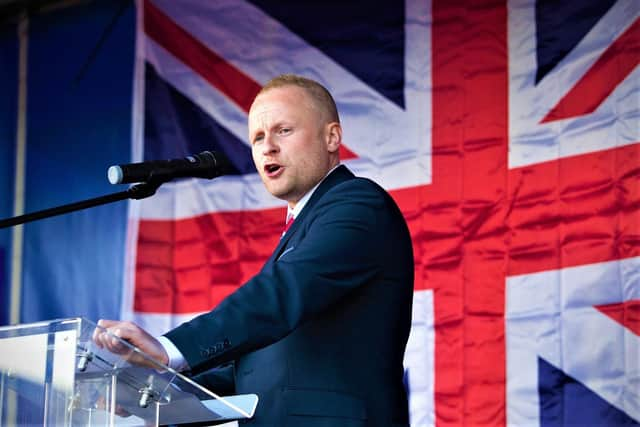Jamie Bryson claims victory over Protocol: here’s precisely how the loyalist believes he has found a way out
and live on Freeview channel 276
Mr Bryson’s group is named Unionist Voice Policy Studies (UVPS).
It released a 32-page document this morning which contains a dense thicket of legal arguments against the current status quo.
These are set out below.


Advertisement
Hide AdAdvertisement
Hide AdIn the words of the Department of Environment, Agriculture, and Rural Affairs (DAERA), ever since last January 1, all agri-food goods, plants, and animals entering Northern Ireland “from all third countries including GB must do so via a Northern Ireland Point of Entry which has been approved by the EU”.
As a result, bio checkpoints have been approved at the ports of Belfast, Larne, Warrenpoint and Foyle, and Belfast International Airport – all collectively known as the Irish Sea border.
Just before Christmas, UVPS sent “pre-action protocol correspondence” to DAERA about “the ongoing and future implementation of the Union-subjugating Protocol”.
This was a warning shot telling DAERA that without the approval from the overarching Stormont Executive (comprised of all 12 of the government’s ministers), any implementation of the Protocol is unlawful.


Advertisement
Hide AdAdvertisement
Hide AdMr Bryson has this morning said that Mr Poots has essentially conceded his point, and that the Executive will now vote on whether to continue with the current arrangements or not.
IT’S COMPLICATED, BUT BEAR WITH US...:
The saga started when Jamie Bryson’s UVPS group wrote to DAERA on December 21.
In his letter he accused the department of a “failure to act in accordance with section 28A (5) of the Northern Ireland Act 1998 and associated paragraph 2.4 of the Ministerial Code”.
So what does that mean?
Well, the Executive Committee is just the formal term for meetings of the Executive.
Advertisement
Hide AdAdvertisement
Hide AdIt is chaired by the First and Deputy First Minister, and typically meets every Thursday.
The argument put forward by Mr Bryson is rooted in the 1998 Belfast Agreement (aka the Good Friday Agreement).
This states, under Strand One, paragraphs 19 and 20:
“(19) The Executive Committee will provide a forum for the discussion of, and agreement on, issues which cut across the responsibilities of two or more ministers, for prioritising Executive and legislative proposals, and recommending a common position where necessary (eg, in dealing with external relationships).
“(20) The Executive Committee will seek to agree and review as necessary a programme incorporating an agreed budget linked to policies and programmes, subject to approval by the Assembly, after scrutiny in Assembly committees, on a cross-community basis.”
Advertisement
Hide AdAdvertisement
Hide AdIn other words, the Executive should be in charge of drawing up a programme for government; basically a costed plan for what they want to achieve.
Then the 1998 Northern Ireland Act, which gave legal force to the 1998 agreement, has this to say about meetings of the Executive Committee:
Section 20, clauses 3 and 4:
“The Committee shall have the functions set out in paragraphs 19 and 20 of Strand One of the Belfast Agreement...
“The Committee shall also have the function of discussing and agreeing upon, where the agreed programme referred to in paragraph 20 of Strand One of that Agreement has been approved by the Assembly and is in force, any significant or controversial matters that are clearly outside the scope of that programme;
Advertisement
Hide AdAdvertisement
Hide Ad“Where no such programme has been approved by the Assembly, any significant or controversial matters;
“Significant or controversial matters that the First Minister and deputy First Minister acting jointly have determined to be matters that should be considered by the Executive Committee.”
Section 28A (5) of the 1998 Northern Ireland Act also goes on to say: “The Ministerial Code must include provision for requiring Ministers or junior Ministers to bring to the attention of the Executive Committee any matter that ought, by virtue of section 20(3) or (4), to be considered by the Committee.”
‘CROSS-CUTTING OR CONTROVERSIAL’:
The final piece of the puzzle relates to the Ministerial Code itself, which basically sets out how Stormont ministers should behave.
Advertisement
Hide AdAdvertisement
Hide AdSection 2.4 of the code imposes upon ministers the demand that they must “bring to the attention of the Executive... any matter which (i) cuts across the responsibilities of two or more ministers...
“(iii) requires the adoption of a common position...
“(iv) has implications for the Programme for Government;
“(v) is significant or controversial and is clearly outside the scope of the agreed programme referred to in paragraph 20 of Strand One of the Agreement”.
In short then, what Mr Bryson’s group is arguing is this:
The Good Friday Agreement and 1998 Northern Ireland Act both require the Executive to discuss and agree upon matters which cut across the responsibilities of two or more ministers – something which he argues is clearly the case with Brexit and the NI Protocol.
And if that is not enough to force the whole issue of the Protocol onto the agenda of an Executive meeting, there is another argument.
Advertisement
Hide AdAdvertisement
Hide AdThe 1998 agreement and act also suggests that the main point of the Executive is to pursue a costed programme for government, but that “any significant or controversial matters” which fall outside of this also need to be brought before the Executive.
This is all then backed up by the Ministerial Code itself, which says effectively the same thing.
So how has DAERA reacted?
POOTS INTENDS TO RAISE MATTER WITH EXECUTIVE:
A response letter to Mr Bryson came from Mr Poots on December 31, saying:
“I can confirm that it is my intention to bring a paper to the Executive in the coming weeks (and not later than the end of January) in relation to the continued and future implementation of the Protocol.”
Advertisement
Hide AdAdvertisement
Hide AdMr Bryson has chalked this up as a massive win for the anti-Protocol camp, saying Mr Poots has “conceded” to his arguments.
“This is a significant and potentially defining victory,” he said, because once the whole issue of the Protocol is placed before the Executive, the rules on cross-community joint decision-making mean that the issue of how to operate the Protocol will “be subject to a unionist veto”.
‘IT’S A MATTER FOR DAERA’... WHO WON’T RESPOND:
The News Letter sought reaction from both the Executive Office and the DAERA.
Neither responded to emails, and when phoned a press officer for the Executive Office said it was a matter for DAERA.
Advertisement
Hide AdAdvertisement
Hide AdIn turn, DAERA could not be reached by phone at all, with voicemails instructing journalists to contact them by e mail, which yielded no response.
Back in November, farming minister Edwin Poots had been pressed on the subject of trade during ministerial question time at Stormont – particularly on the question of whether he was prepared to “cease all checks at our ports which are being exercised under the protocol”.
Mr Poots had replied at the time that he was “continuing to seek the removal of all trade barriers within the United Kingdom”, adding that the Irish Sea border had only served to create “difficulties in trading with what is by far our biggest market”.
More from this reporter:
News Letter exclusive on the fall-out from Gerry Adams court dispute: Lawsuits against the state from people interned in Northern Ireland 50 years ago now number up to 400
Advertisement
Hide AdAdvertisement
Hide Ad——— ———
A message from the Editor:
Thank you for reading this story on our website. While I have your attention, I also have an important request to make of you.
With the coronavirus lockdowns having had a major impact on many of our advertisers — and consequently the revenue we receive — we are more reliant than ever on you taking out a digital subscription.
Subscribe to newsletter.co.uk and enjoy unlimited access to the best Northern Ireland and UK news and information online and on our app. With a digital subscription, you can read more than 5 articles, see fewer ads, enjoy faster load times, and get access to exclusive newsletters and content.
Visit
https://www.newsletter.co.uk/subscriptionsnow to sign up.
Advertisement
Hide AdAdvertisement
Hide AdOur journalism costs money and we rely on advertising, print and digital revenues to help to support them. By supporting us, we are able to support you in providing trusted, fact-checked content for this website.
Ben Lowry, Editor